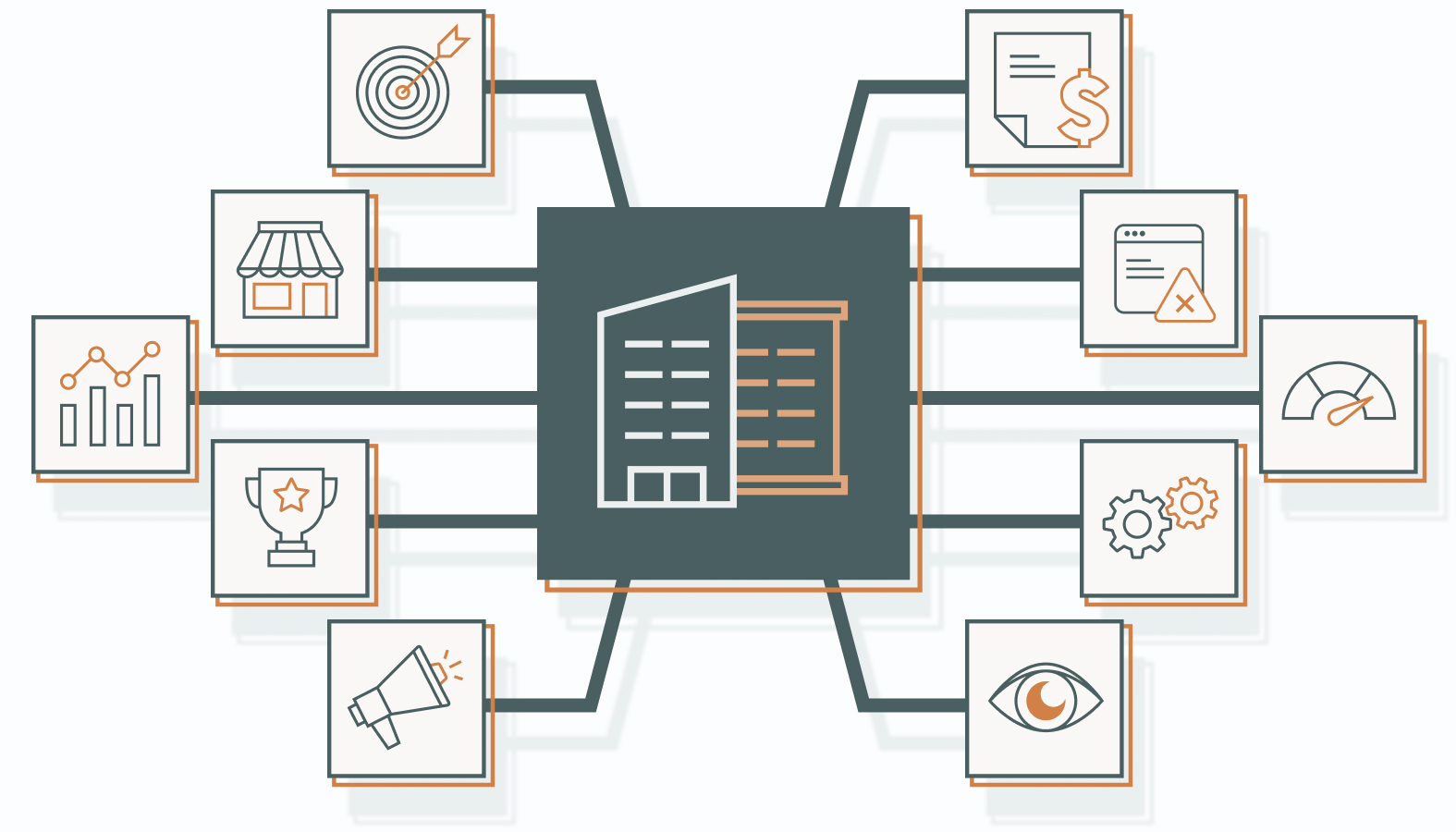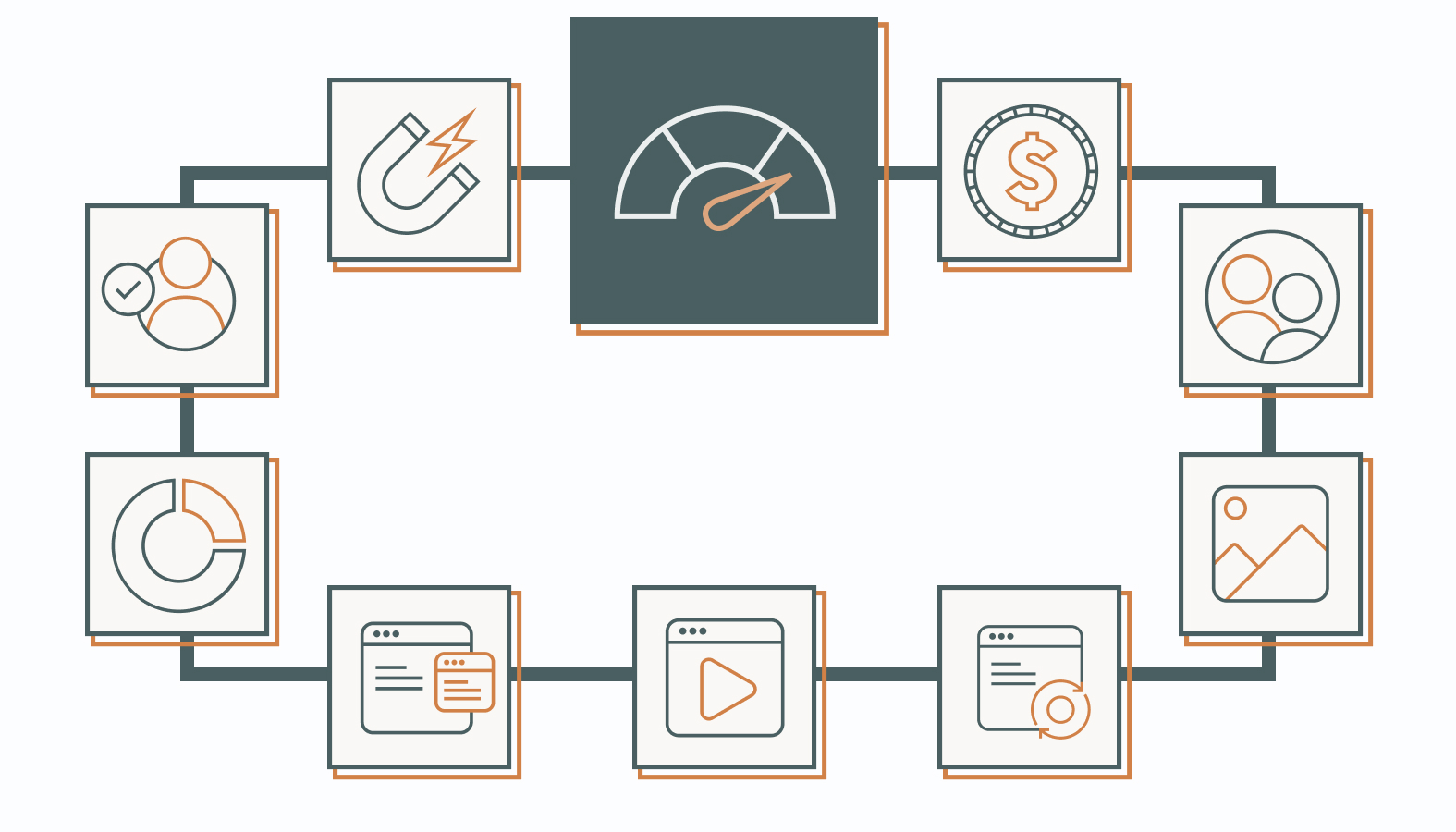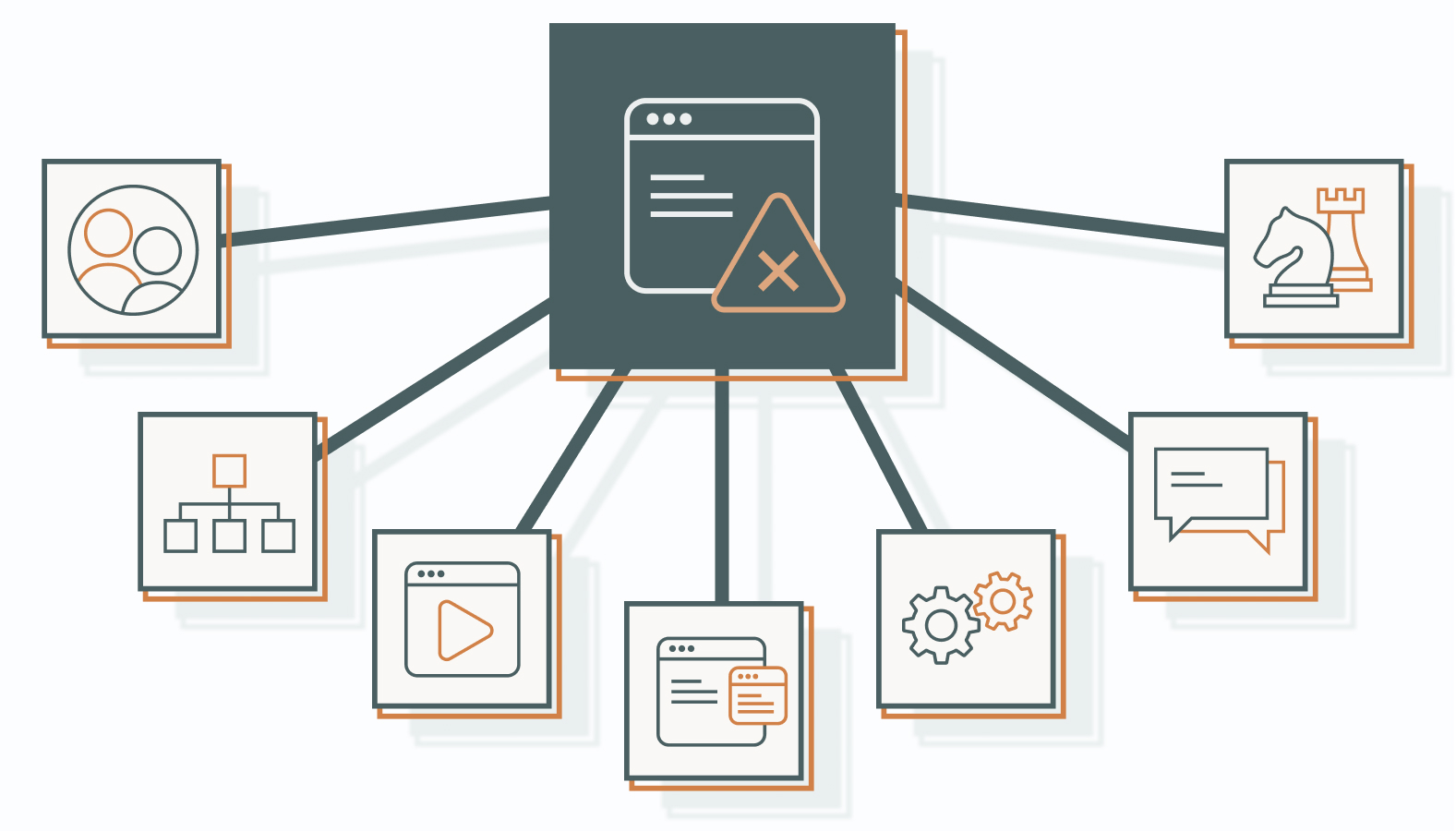Business-to-business or B2B digital marketing uses digital channels to sell products and services to other businesses and organizations. It’s a bit more complex than business-to-consumer (B2C) transactions because it usually involves more steps and a longer decision-making process.
B2B companies use digital strategies as a way to reach potential customers, influence them to buy, and build lasting relationships. Over recent years, B2B digital marketing has changed tremendously. There’s been a shift from traditional marketing approaches to a mix of content marketing, SEO, and data-driven analytics.
With the help of technology, B2B companies can now deliver personalized experiences, generate qualified leads, and nurture business relationships more effectively than ever before.
Laying the Groundwork for a Stellar B2B Digital Marketing Strategy
Crafting the best B2B digital marketing strategies involves tailoring a plan that fits a business’s unique objectives and market position. A clear strategy guides it through audience engagement, prospecting, and, ultimately, sales conversions. It’s the plan that guides all marketing efforts to ensure they help achieve the business’s end goals.
Alignment With Business Goals
Aligning a B2B digital marketing strategy with overarching business goals is important. It begins with a clear understanding of what the business aims to achieve – be it market expansion, customer retention, or revenue growth.
Every aspect of the digital marketing plan should help reach these goals. For instance, if the goal is to enter a new market, digital marketing efforts should aim to establish brand awareness and credibility within that market segment.
Understanding the Target Market
Next to alignment with business objectives, a deep understanding of the B2B target market is crucial. This involves knowing the common problems in the industry, who makes the purchase decisions, and how your offering can meet your target market’s needs.
Such understanding informs content creation, messaging, and the selection of the most appropriate digital channels to expand your reach of audience effectively.
Competitive Analysis
Competitive analysis is another key part of B2B digital marketing. It provides insight into where competitors excel and where gaps in the market exist. Through methods like SWOT analysis, social listening, and direct competitor comparison, a business can carve out a niche or capitalize on competitors’ weaknesses to strengthen its market position.
Value Proposition
In B2B marketing, a strong value proposition is what sets a company apart. It explains how your product or service solves customers’ problems or improves their situation and why they should buy from you and not the competition. Your value proposition should be clear in every piece of content and messaging you put online.
Marketing and Sales Plan
Integrating marketing and sales is often the key to successful B2B digital marketing tactics. Sales teams need the leads that marketing teams generate, and marketers need the conversion data from sales to measure the effectiveness of their plans. When both are synchronized, the process from lead to purchase is seamless, making sales and repeat business more likely.
Resource Management
Efficient resource management is crucial in executing a B2B digital marketing strategy. It involves using human, financial, and technological resources wisely. Whether it’s assigning skilled team members to manage different campaign aspects or investing in the right marketing technologies, resource management ensures every effort is as productive as possible.
Risk Assessment and Management
Conducting a risk assessment enables B2B specialists to anticipate and prepare for potential problems to avoid or mitigate them. Online risks can range from data privacy concerns to technology outages. Taking steps early to identify and manage these risks is critical to keeping a smooth marketing operation.
Performance Metrics and Analysis
The significance of performance metrics in B2B digital marketing can’t be overstated. By setting and tracking the right key performance indicators (KPIs), you can evaluate your online marketing efforts against your business goals. Keeping an eye on B2B website traffic, conversion rates, and customer acquisition costs helps you understand what’s working and what to improve.
Adaptability and Flexibility
In digital marketing, adaptability is important. Strategies should be flexible enough to respond to market changes, technological advancements, and changing customer expectations. Making your B2B digital marketing plan flexible allows for improvements and agility during uncertainty.
Long-Term Vision and Short-Term Goals
Finally, it’s about striking the right balance between your long-term vision and short-term goals. While the vision sets the direction for the company’s future, short-term goals act as milestones along the way. These goals not only provide motivation through achievable wins but also offer opportunities for recalibration as needed.
Measuring Success in B2B Digital Marketing
In B2B digital marketing, success isn’t just having a good product. It’s about understanding how the product was made, how many liked it, and who’s going to want more.
Analytics and KPIs help measure the impact of marketing efforts. They provide insights to refine your strategies, allocate your resources efficiently, and ultimately, prove return on investments (ROI).
KPIs to Track and Evaluate
Tracking the right KPIs shows the effectiveness of each campaign and initiative. These KPIs help businesses navigate the digital marketing space with precision. They provide the benchmarks to measure growth, engagement, and the overall health of marketing strategies.
Let’s explore the essential KPIs that all B2B marketers should watch out for.
Lead Generation
Lead generation is a fundamental KPI in B2B digital marketing. It’s about attracting prospects and guiding them until they’re convinced to buy from you and become a loyal customer.
Tracking this can be done through various methods, such as monitoring website traffic, form submissions, or content downloads and then analyzing conversion rates to see how many leads are actually moving further down the sales funnel.
Lead Quality
Lead quality tells how likely a prospect will become a paying customer. Having a few high-quality leads can be more valuable than having a large list of unqualified ones.
You can measure lead quality through their engagement with your content and interaction with your sales team and by tracking their behaviors and attributes against your ideal customer profile.
Sales Metrics
Sales metrics are the scoreboard of B2B digital marketing. They tell you the financial value of your marketing efforts by tracking longer sales cycle length, average deal size, and revenue closed. By monitoring these indicators, you can see how your digital marketing activities directly affect your actual business outcomes.
Website Performance
Your website is often the first impression of your B2B company, so its performance is a critical KPI. Metrics such as page load times, bounce rates, and session duration can indicate the health of your website. A well-performing website makes it easy for customers to find what they need and helps turn them into buyers.
Content Engagement
Content engagement measures how your audience interacts with your content. Whether it’s a whitepaper download, a blog post share, or time spent on a webinar, these indicators reflect the effectiveness of your content marketing efforts. High engagement rates usually indicate that the content resonates well with your target audience.
SEO Success
Search engine optimization is the backbone of digital visibility. A strong SEO strategy helps your business get found by the right people at the right time. SEO success is measured by improved rankings for your targeted keywords, organic traffic to your site, and ultimately, organic conversions.
Social Media Metrics
In B2B digital marketing, social media indicators like engagement rate, follower growth rate, and click-through rates are essential. They show how your content performs on social media and how it helps promote your brand and thought leadership.
Customer Retention
Customer retention is keeping current customers over a long period of time. It shows the value your business provides. High retention rates signal customer satisfaction, brand loyalty, and a greater customer lifetime value (CLV). This KPI is often reflected in repeat purchases, subscription renewals, and referrals.
Return on Investment (ROI)
ROI in B2B digital marketing is the calculation of what you spend versus what you earn from your efforts. It’s critical because it shows if your marketing activities are making a profit. Successful B2B digital marketing campaigns clearly show how spending leads to revenue generation, proving they’re worth the investment.
Tools for Tracking and Analysis
Having the right digital marketing tools in your digital marketing kit is key. Tools for tracking and analysis guide B2B experts through the vast amount of data and help them understand patterns, monitor campaign performance, and stay ahead of market trends. They turn the data into useful insights for informed decision-making.
Monitoring Campaign Performance
For monitoring campaign performance, it’s essential to have robust tools that can capture real-time data and provide insights into user behavior. Here are some recommendations:
- Google Analytics – An indispensable tool for tracking website traffic, user engagement, and the performance of each digital marketing channel
- HubSpot – A comprehensive inbound marketing platform that offers detailed reports on customer acquisition, email marketing performance, and overall customer interactions
- Marketo – A marketing automation tool that excels at campaign management across multiple online channels and measures the impact on revenue
- Salesforce Pardot – Ideal for B2B marketers looking to track the effectiveness of their communication and automate engagement with leads and customers
Monitoring Market Trends
Staying current with market trends ensures your strategy aligns with the market’s pulse. Here are some tools that can help:
- SEMRush – Provides SEO insights and competitive analysis and helps identify trending keywords
- Ahrefs – Offers detailed content analysis and keyword research and tracks the ranking progress over time
- BuzzSumo – Great for content marketing insights, it shows what content is popular by topic or on any website
- Google Trends – A free and simple tool for understanding the popularity of search queries in Google Search across various regions and languages.
B2B Digital Marketing Trends
As the digital marketing landscape continues to evolve, B2B professionals must keep up with the latest trends to elevate their strategies. It’s not just about staying relevant – it’s about standing out and differentiating your brand in a saturated market.
Let’s explore some of the most compelling trends shaping the future of B2B digital marketing.
Integration of AI and Automation
Artificial intelligence (AI) and automation have completely transformed B2B marketing, giving rise to a more efficient, data-driven approach. These technologies don’t replace the human touch but are powerful tools that enhance marketing strategies.
Chatbots, for instance, are transforming customer service by providing immediate responses to queries, while predictive analytics allows marketers to anticipate customer needs and target them with precision. The result? Streamlined operations, personalized customer experiences, and a wealth of insights from marketing data.
Video Marketing and Webinars
The adage “seeing is believing” has never been more accurate in B2B digital marketing, with video marketing and webinars emerging as front-runners.
Videos are highly engaging and effective in conveying complex information in an accessible manner. Meanwhile, webinars allow real-time interactions and establish brands as thought leaders in their industries. Both formats create rich, immersive experiences that can significantly increase engagement and conversion rates for B2B customers.
Advanced Personalization Techniques
In a world awash with content, personalized experiences grab B2B buyers’ attention. Advanced personalization techniques use data to craft tailored messages that resonate deeply with each segment of the target audience.
This customization goes beyond addressing someone by their name. It’s about creating relevant content that addresses the needs and pain points of the customer at the right time. B2B professionals who master personalization will not only help you stand out in the crowd but also help you build deeper connections and lasting business relationships.
Real-World Examples of Successful B2B Digital Marketing
Let’s look at some companies that have excelled and learn from their experiences.
SEO Strategies That Yield Results
Effective SEO can be a game-changer for a B2B company by significantly increasing its visibility and authority in a crowded market.
HubSpot
One notable example is HubSpot, which has grown its reputation and improved lead generation on the back of strong SEO. By creating consistent and high-quality content and understanding its target audience’s search behavior, it has managed to rank for many valuable keywords. This organic reach has led to a significant number of leads without continually spending for paid ads.
Email Marketing that Converts
Email marketing campaign remains a powerful tool in B2B for nurturing leads and driving conversions.
Adobe
Take Adobe’s Marketo, for instance, which uses highly segmented and personalized email campaigns to speak to the needs of different user groups. By delivering content that fits what users need at various stages of the funnel, it has increased engagement and conversions.
Its success lies in knowing how to craft messages that matter to the buyer when they need them, leading to a better user experience and, ultimately, higher conversions.
Preventing Common Pitfalls
There are many opportunities in B2B digital marketing, but also plenty of ways to get off track. Here are some typical mistakes B2B experts make and how to avoid them.
Lack of a Defined Target Audience
One of the cardinal sins in marketing is the lack of a clearly defined target audience. Trying to appeal to everyone can make your message weak and ineffective. This can lead to wasted resources and a marketing strategy that resonates with no one.
To prevent this, conduct detailed market research to define and understand buyer personas. This means diving deep into the demographics, firmographics, pain points, and goals of your potential customers. With this knowledge, you can create targeted plans that strike a chord and drive engagement.
Ignoring the Buyer’s Journey
Another misstep is ignoring the buyer’s journey — the process prospects go through from first hearing about the product to deciding to buy it. Marketing strategies and content that don’t match this journey will fail to engage prospects effectively.
To properly guide people toward the buying process, you must understand every stage your customers go through: awareness, consideration, and decision. Creating content and interactions for each stage ensures you provide the right information at the right time, guiding prospects closer to buying.
Underestimating the Value of Content Marketing
Neglecting the power of content marketing can severely weaken a B2B marketing strategy. Content marketing isn’t just about filling up your blog or resources page; it’s about providing valuable, informative content that positions your company as a thought leader.
Investing in a good content marketing strategy means producing educational and insightful pieces, such as blogs, whitepapers, and case studies, that answer real questions and help solve your customers’ problems. This can build trust and authority in your industry, which is essential for long-term success.
Overlooking SEO
Failing to optimize your online content for search engines is like keeping a brilliant book locked away. Without SEO, your content may never see the light of day, no matter how good it is, leading to poor visibility and missed customer acquisition opportunities.
Implementing SEO best practices, such as thorough keyword research and on-page optimization, is crucial to improving organic search rankings and visibility. This increases traffic to your site and ensures your content reaches the right audience.
Inadequate Utilization of CRM and Marketing Automation
Even the best-crafted messages are of little use if they don’t reach the right people at the right time. Many B2B companies fail to use CRM and marketing automation tools to their full potential, resulting in inefficiencies and missed opportunities.
Using customer relationship management (CRM) data to segment audiences and tailor communications can significantly improve the effectiveness of your marketing. Marketing automation can further refine this by nurturing leads and evaluating them, which helps move prospects through the B2B sales funnel more efficiently.
Overlooking Customer Feedback
In the pursuit of new leads, it’s easy to forget the valuable feedback existing customers have. Not collecting or acting on customer feedback can lead to a disconnect from the audience’s current needs and preferences.
It’s important to regularly ask customer opinions through surveys, social listening, and direct outreach to make better marketing decisions that meet customer expectations and market demands.
Short-Term Focus Over Long-Term Strategy
Lastly, focusing on short-term gains at the expense of long-term strategy can hurt your business’s growth. While quick wins are important, they shouldn’t overshadow the broader vision and objectives of your company.
It’s best to combine immediate tactics with long-term planning to ensure your marketing efforts contribute to the bigger picture. This way, your marketing stands the test of time and drives continuous growth.
Your Next Steps in B2B Digital Marketing
Starting with B2B digital marketing is a mix of using data smartly and being creative to capture your audience’s attention. We’ve covered a lot of ground in this article, from strategies and tools to trends and pitfalls. But B2B digital marketing is vast and constantly changing, and sometimes it’s helpful to have an expert to guide you.
If you’re considering improving your B2B digital marketing or looking for guidance on your current strategy, we’re here for a chat. Schedule a candid conversation with one of our marketing experts, and let’s explore the digital landscape together.
We’ll offer unbiased insights and genuine advice to improve your digital marketing in a way that works best for you. Our mission is to help make your journey in digital marketing smooth and successful.










